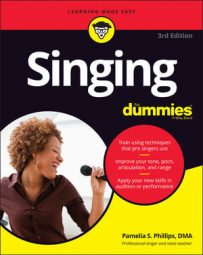The audition pianist can be your friend or foe, based on how you behave. Most of the time, the pianist who is at the singing audition is a really swell person who plays like a dream.
A few simple actions that seem harmless to you can really set off an accompanist, so here are a few tips:
Don’t try to shake hands with the audition pianist, even if you think it’s good manners. Shaking hands translates to squeezing someone’s hands, no matter how gently. The pianist doesn’t want swollen fingers after shaking hundreds of hands during a long audition day.
Smile and address the pianist with respect when you provide your tempo or point out the road map in your song. Briefly, but very nicely, describe what you’ve highlighted or point out any tough spots. Your conversation with the pianist has to be quick — be brief and to the point. Practice briefly describing your tempo and the road map of the song, and practice how you’ll indicate to start.
Never snap your fingers to give the accompanist the tempo. Snapping may be an easy way to describe your tempo, but many accompanists take offense to it. Instead, quietly speak a few words at the speed you want to sing.
Explain how you plan to indicate that you’re ready to begin. You can nod your head or look up to let the pianist know that you’re ready to begin.
You can hope that the audition pianist can transpose at sight, but you can’t assume this skill. Feel free to ask whether she can transpose, but if she hesitates or says no, choose something else to sing.
Reading music on the page and transposing at sight are two different skills. Unless someone is used to transposing a song, it may not be her strongest skill. You may also hear more wrong notes as the pianist attempts to read it in your favorite key.
Be safe, and get the song transposed and written out well in advance of your audition. Better yet, choose a song that’s already in the key you can sing well.
Thank the pianist just before you leave. You may not know the pianist personally and may assume that he’s just a really cool person who only plays the piano. But the audition pianist may be the musical director. Be sure to read the suggestions on how to prepare your music for the audition so that the pianist enjoys meeting you and playing your song.

